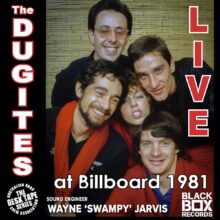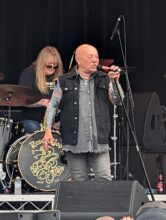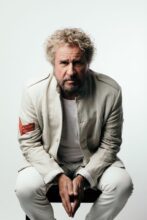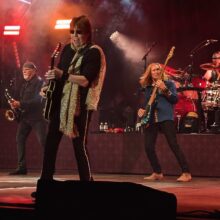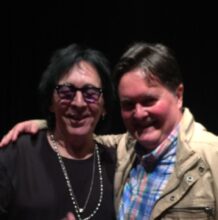The following interview with Carlos Santana with Paul Cashmere took place in 1994.
Carlos Santana is one of the rock era’s true legends.
A 30 year career has made Santana one of the greatest rock acts of all time. Even more amazing is the fact that after all his time in music, he has delivered the biggest album of his career only this year.
Santana’s ‘Supernatural’ is already being cited by music critics as next year’s ‘Album of the Year’ at the Grammy Awards.
We take you back to Santana interview when Carlos spoke to Paul Cashmere about the milestones of his career.
PAUL CASHMERE: Carlos Santana welcome back to Australia, out here again with all the band. First time in quite a few years.
CARLOS SANTANA: Yeah it’s been a long time and I’m very grateful that Paul Dainty invited us back.
PAUL CASHMERE: The whole Latin thing is happening now, but you’ve been part of Latin music for many, many years. Just to quote one of your albums, Sacred Fire, Live in South America. I guess that’s a fairly exotic place to record an album?
CARLOS SANTANA: Yeah, we played there in 1994. We played in Santiago Chile, first time ’cause we did South America in ’73 like the first time we played in Australia and we hadn’t been back there since. I heard Prince went there and Sting went there and Guns ‘n’ Roses. In fact we played 2 days after Guns ‘n’ Roses in Chile. They did 45,000, 35,000 and we did 90,000. In all fairness we charged half the ticket price, and we let children under 13 in for free, and that brings the grandparents, but nevertheless we played for four hours and it was a complete and utter spiritual orgasm. All people were bugging out and we said we gotta come back to South America and capture this on video, and we did that, we went to Mexico, Venezuela, Chile and Argentina and that’s where we came out with the video. We wanted to let people know that this dinosaur is not ready to be put in the pasture. There are very few bands in this world, that are just the music alone. We don’t rely on mini-skirts or laser machines or smoke bombs. All the gimmicks that most of the cheap bands rely on. It was not a burlesque show, it was not a light show, we don’t spend two million dollars on lights alone.
PAUL CASHMERE: Have you had the opportunity to record here?
CARLOS SANTANA: No, I’d love to. I’d love to some day be able to come here and invite musicians, the aborigines, and also there was a bass player, I never knew his name but he was the bass player for Little River Band and he was an incredible bass player. He was left handed and the first one to drop out and that motherfucker was incredible. I don’t know what happened to him. I’d sure like to play with him some day. I hope he can still play.
PAUL CASHMERE: You’ve got your own record label too and you’ve got the Live Forever record that’s just come out through that.
CARLOS SANTANA: Right, I got a chance to talk to all the families and they all said yes. Marvin Gaye, Jimi Hendrix, Bob Marley, John Coltrane, Stevie Ray Vaughan, and literally all of them is the last concert, all of them, the last concert, except for Jimi Hendrix. Bob Marley, last concert. Stevie Ray, last concert. Coltrane, last concert.
PAUL CASHMERE: It must be a real labour of love then.
CARLOS SANTANA: Yeah that’s exactly what it was man, and I feel really grateful that the families actually said to me, we trust your hearts intentions, do it. Once the family says do it, I’ve got a big machete, I can cut a path through all the lawyers and the record companies because the family already said yes. I am very very proud and very grateful to start my own music company with Live Forever It’s literally a celebration of the music of Jimi Hendrix, Bob Marley, Marvin Gaye, Stevie Ray and John Coltrane. I almost got Miles Davis, but I didn’t. I do have his last recording.
PAUL CASHMERE: Will there be another in the series?
CARLOS SANTANA: We want to do one for women, to be fair. One for Billie Holiday, Sarah Vaughn, Diana Washington people like that, ladies like that. I also want to do a video. There’s a video I did with Stevie Ray Vaughan called ‘Space Between The Nose’, Stevie Ray Vaughn, Joan Jett, the guitar player from Cheap Trick, and it’s all about guitar. It’s called Space Between The Nose, and I also want to do another video, I mean cassette, er, a CD for Bob Marley’s music. It’s all played with Bob Marley’s musicians and the symphony without Bob Marley and even though Bob Marley’s not there you feel his presence and it’s not music. I feel that his music is very very well played, it’s not music but it’s something that housewives can get into. I know people like to smoke pot or do drugs behind Bob Marley’s music because they can still enjoy it. So I’m going to see if I can convince Chris Blackwell and the family to let me release some music honourably and legistically, legally correct, to get the new generation behind Bob Marley. There’s a lot of things to be done. I just finished an album with my brother and my nephew, all guitar. It’s called Brothers and I feel really grateful. I think that a lot of women, they need to be careful when they listen to this album because they’ll definitely get pregnant. They need to be careful. There’s about four songs in a row where they need to keep their legs closed or be careful because they will definitely get pregnant.
PAUL CASHMERE: I guess there’s probably a few thousand children conceived to your music though.
CARLOS SANTANA: I guess so. I go to Verona in Italy and people tell me “Oh Sophia” and I say What!? What are you talking about? And they tell me that he’s got his wife pregnant and now they got a little girl called Sophia because they made love to Europa or something, but I tell you if they don’t watch out on this next album I gotta tell them, I gotta put on the album I’m not responsible, I will not pay child support so listen to it at your own risk. But there is something really beautifully romantic about it.
PAUL CASHMERE: Some of your bigger hits here have been cover versions. Does a hit mean anything to you?
CARLOS SANTANA: Only if it’s done honourably and dignified. For example, when Aretha Franklin says I’m Eleanor Rigby, I pick up the rice, you can’t question it. When Miles Davis played Time After Time or Human Nature, you couldn’t question it. I would only cover someone’s music if I could put my fingerprints so deeply on it that people will say that’s Santana’s music. Like Black Magic Woman, to this day it’s not Peter Green or Fleetwood Mac’s Black Magic Woman. They get the royalties but it’s my song. People recognise it and say “that’s Santana” and others go “No, but Peter Green wrote it” and they say “I don’t give a shit that’s Carlos Santana”. So I would only do somebody else’s music if I feel that we can put it in such a way that people will say yeah that’s believable. It’s not convenience, it’s not real love. There’s a difference between convenience and real love.
PAUL CASHMERE: You also did the same with She’s Not There. You really put your stamp on that one.
CARLOS SANTANA: Yeah, Bill Graham is the one who used to bring the songs to me. It took me four years to say I don’t want to do that one. I was driving around when I was listening to the Beatles, Help! with the sitars and James Bond kind of thing, and I heard the bass line, kind of like Marimba’s. I went home and I arranged it differently, and it sounds like us. It took a little bit of traffic, but by the time we finished, it sounded different to what the song is, but you can do any song as long as you do it from your heart and if you do it sincerely, it can be honourable and respectable.
PAUL CASHMERE: Where did Evil Ways come from?
CARLOS SANTANA: Evil Ways came from Bill Graham again. It came from a guy named Willie Bobo, who passed. He came with us when we went to Africa in 1970, and the same thing, by the time we got a hold of it, it was our song. He got the royalties but it was our song.
PAUL CASHMERE: How did it come about using your own name to name the band?
CARLOS SANTANA: We came out of San Francisco when most of the bands were blues bands. Steve Miller Band, Paul Butterfield Blues Band, John Mayall Blues Band so let’s call it the Santana Blues Band because we really loved to play the blues. And after a while we realised there were too many blues bands, so we just dropped the blues band and just became Santana and that’s how it started.
PAUL CASHMERE: You’ve had some great people through the band over the years. You’ve probably been a launching pad for a lot of career’s over the years, how many people have been through the band?
CARLOS SANTANA: I stopped counting man, it’s like 40 or 50, maybe 75 now. I feel really really grateful for not being the Rolling Stones or the Grateful Dead to not be around the same people because I would probably go nuts anyway. But nevertheless I’ve been with this band for a long time. CT is my guitarist since ’82, ’83, Raoul since ’76. Carl Barasso, he’s been with me for 3 or 4 years, he’s played with Prince. The drummer is incredible, he’s a truly gifted musician, Rodney Holmes. I don’t know man, but I really like change, and like all the musicians to go through my band, they can also… like they say in Star Trek, live long and be prosperous and that’s all I want. I wouldn’t hold anybody, I don’t want anybody to transcend me. I tell kids today in the streets, I say, you play? Yeah! I play guitar and I say you keep practicing man and maybe one day I’ll be supporting you. Just like B.B. King opens up for me sometimes, I can say it not with arrogance but I say it with respect. B.B. King opens up with me sometimes, so does Buddy Guy. It doesn’t mean that I’m better than them, it just means that I’m more popular and I bring more people, maybe one day some kids in the streets of Melbourne, I will open up for them one day. But they have to practice, otherwise they will not kick my butt, I will kick their butts.
Stay updated with your free Noise11.com daily music news email alert. Subscribe to Noise11 Music News here
Be the first to see NOISE11.com’s newest interviews and special features on YOUTUBE and updated regularly. See things first SUBSCRIBE here: Noise11 on YouTube SUBSCRIBE


